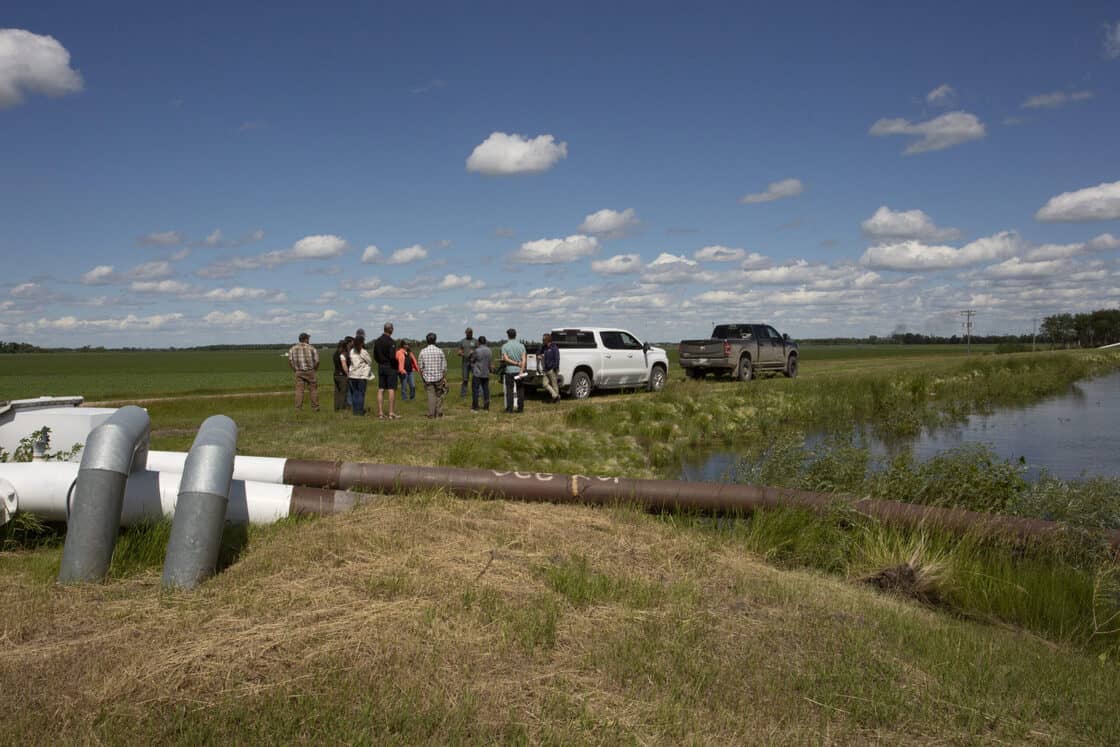Water and agriculture are fundamentally connected. So considering the watershed when approaching agricultural sustainability is good practice with myriad benefits.
Recently, the J.R. Simplot Company, in partnership with other multinational organizations and non-profits, completed the first phase of a pilot water stewardship project in the Lake Winnipeg Basin in Manitoba, Canada. The Lake Winnipeg Basin (LWB) project is a unique, innovative initiative. It seeks to help farmers succeed in water stewardship by – for the first time – applying global standards for valuing water stewardship and social impact to measure outcomes from local, on-farm water management. Simplot owns and operates a large potato processing plant in Portage La Prairie, Manitoba, which is just one reason the Company felt it important to participate in this one-of-a-kind endeavor.

The LWB project brought together Simplot and three other companies, two environmental groups, and four large-scale farmers to discover the best approach to water stewardship in the area. The four participating farms cover 34,000 acres within the Central Assiniboine and Redboine Watersheds, which are sub-areas within the Lake Winnipeg Basin; all grow potatoes for Simplot in addition to other crops, like grains and oilseeds.
With the support of the project, the growers and their agronomists developed comprehensive water stewardship plans in accordance with Alliance for Water Stewardship’s (AWS) International Water Stewardship Standard. These plans provided source material for a comprehensive analysis of cropland and edge-of-field water stewardship practices, helping determine which practices drive the most value for
the environment, communities, and the value chain.
Following water stewardship plan development, EcoMetrics LLC measured what actions deliver the most value, in terms of dollars, to the farms, the environment, and the broader community when the plans are put into practice. The results of the study indicate that the farms already bring value to the community under current operation. However, there is significant additional potential value to be gained by implementing the proposed water stewardship plans.
In sum, the study found that water stewardship efforts will realize the most value if implemented as a combination of:
- Cropland stewardship strategies, such as changes in tillage or adoption of precision agriculture technologies or crop rotation
- Enhancements to edge-of-field, marginal farmland, such as developing wetlands, hedgerows, and green spaces
it’s good business,” said Simplot Sustainability Director Brandy Wilson. “The results of this project show that taking a watershed-level, partnership approach to agricultural sustainability drives benefit for the environment, communities, and local governments in significant ways that can be measured in dollars,” she added. and “Simplot has proactively been integrating sustainability for years because it’s the right thing to do
The LWB project sets the stage for the agri-food sector to have a replicable, scalable, and sustainable methodology for investing in and achieving positive watershed-based outcomes. As the project moves into future phases, the project partners anticipate driving investment to specific actions and continuing to measure and evaluate outcomes.
Participating farmer Chad Berry of Under the Hill Farms shared his perspective on the project and its importance. “In the world currently, there’s more and more push from the public to have food sustainability. Therefore, we are seeing more push from buyers to have us, the farmers, participating in programs such as this as a sort of ‘record’ to show what good we are doing. We want to stay ahead of the curve and be proactive.”
Agriculture dominates the southern portion of the Lake Winnipeg Basin, supplying food for Canadian and international markets, including grains, vegetables, dairy and livestock.
Simplot is part of this group of producers; Portage is Simplot’s largest food processing plant. It was built in 2003 and underwent a major expansion in 2019.
Simplot relies heavily on growers in Manitoba to provide raw product to our potato and vegetable processing plants. Water is a critical, shared resource, and stewardship practices represent an opportunity for producers, and for others, like Simplot, who want to support the long-term resilience of the agricultural sector, communities and the natural world.
In addition to Simplot, the founding partners of the LWB project include Nutrien, BASF, General Mills, ALUS Canada, and The Water Council.




